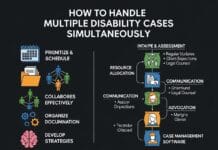Did you know that as of 2024, 6.9 million Americans aged 65 and older are living with dementia? Dementia is a progressive condition that affects cognitive functions such as memory, thinking, and reasoning.
Understanding the stages of dementia can help individuals, caregivers, and healthcare professionals better understand the changes in patients’ behavior and abilities as the condition progresses.
When exploring the life expectancy for various stages of dementia, it becomes clear that the progression is different for each person, and not everyone will experience the same progress or impairment. Each stage offers unique insights into the evolving needs and behaviors of individuals struggling with dementia.
Overview of Dementia Stages
Dementia progresses through several stages, each with its own set of symptoms and challenges. The initial stage is often characterized by mild cognitive impairment, where individuals may experience subtle changes in memory, language, or decision-making abilities.
As the condition advances, it enters the moderate stage, where symptoms become more pronounced, impacting daily activities and behavior.
In this stage, individuals may require more assistance with dressing, grooming, and managing finances.
Mild Cognitive Impairment (MCI)
When Mild Cognitive Impairment (MCI) begins, people might see slight changes in memory, language, or decision-making as dementia advances. During this phase, you might experience occasional memory lapses, have trouble finding the right words in conversations, or find it challenging to make once straightforward decisions.
These changes may be noticeable to you and those closest to you but they often don’t interfere significantly with your daily life activities.
Stay vigilant during this stage, as MCI can sometimes progress to more severe forms of dementia. Keeping your mind active with puzzles, reading, or socializing can help maintain cognitive function. Maintaining a healthy lifestyle, including regular exercise and a balanced diet, may support brain health and potentially slow down cognitive decline.
If you suspect you’re experiencing symptoms of MCI, consult with a healthcare professional for a proper evaluation and guidance on managing the condition. Early detection and intervention can make a significant difference in managing cognitive decline.
Early Stage Dementia
During the early stages of dementia, you may start noticing more pronounced changes in your cognitive abilities.
These changes can manifest in various ways, such as forgetfulness, difficulty recalling names or words, and struggling with familiar tasks. You might also experience challenges in planning or organizing and feeling overwhelmed by making decisions or handling finances.
You could start to notice shifts in your mood and behavior. You might feel more anxious or agitated than usual, or you could become more withdrawn from social activities. Changes in sleep patterns, appetite, or interest in hobbies may also occur during this stage.
Seek medical advice if you or a loved one observe these early signs of dementia. Early detection can lead to better management of symptoms and access to appropriate support services. There are resources available to help you go through the upcoming difficulties.
Moderate Stage Dementia
As dementia progresses to the moderate stage, you may experience a significant intensification of cognitive and behavioral changes.
Memory loss becomes more pronounced, affecting not just recent events but also personal information and memories. You might struggle with finding the right words, have difficulty concentrating, and face challenges in completing complicated tasks.
In the moderate stage of dementia, you may also exhibit changes in mood and behavior. This could include increased confusion, anxiety, or agitation. You might become more forgetful of recent conversations, events, or even people’s names. You may find it hard to follow instructions or directions, leading to frustration and a sense of helplessness.
Daily activities like dressing, grooming, and preparing meals may become increasingly challenging. Maintain a safe and supportive environment for individuals in this stage, ensuring they’ve assistance with tasks that are becoming more difficult.
Severe Stage Dementia
Dealing with the challenges of severe-stage dementia can be emotionally and physically demanding for the individual affected and their caregivers.
At this advanced stage, individuals may experience significant memory loss, have difficulty recognizing familiar faces, struggle with communication, and require assistance with daily activities such as eating and dressing. Behaviors can become more unpredictable and challenging to manage, including increased agitation, aggression, and wandering.
As dementia progresses to the severe stage, individuals may also lose the ability to control their bladder and bowels, leading to incontinence. Mobility becomes increasingly limited, resulting in difficulty walking or staying upright without assistance. The risk of infections, such as pneumonia, also rises due to weakened immune systems and decreased mobility.
Caregivers face immense stress and emotional strain as they witness their loved ones deteriorate and struggle to provide round-the-clock care.
Caregivers should seek support from healthcare professionals, community resources, and support groups to help deal with the complications of caring for someone with severe stage dementia.
Conclusion
Now that you know about the stages of dementia, you can better understand what to expect as the condition progresses. Early detection and intervention can help improve the quality of life for those with dementia. Stay informed, seek support, and proactively manage symptoms to provide the best possible care for your loved one.





